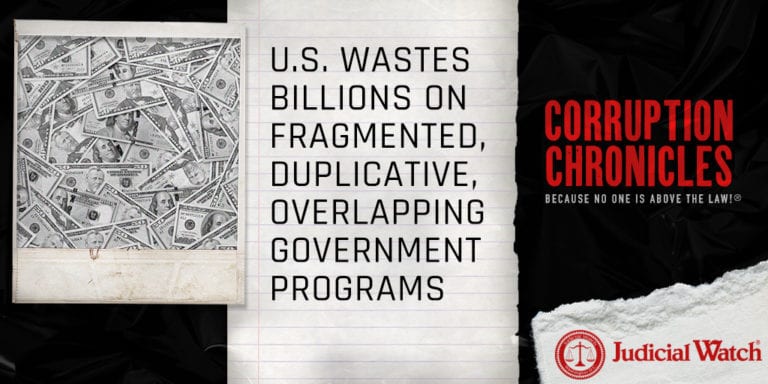
U.S. Wastes Billions on Fragmented, Duplicative, Overlapping Government Programs

U.S. government agencies could save American taxpayers billions of dollars by reducing or eliminating fragmentation, overlap and duplication identified in a federal audit made public this month. The question is whether the various publicly funded entities will bother to take action to mitigate the waste. For nearly a decade the investigative arm of Congress, the Government Accountability Office (GAO), has documented more than 1,100 cases of fragmented, overlapping, or duplicative federal programs in areas ranging from healthcare to defense, the production of U.S. currency and disaster response. Only around half of the GAO’s recommendations to curb waste have been fully implemented in the past nine years, resulting in “hundreds of billions of dollars in financial benefits,” according to U.S. Comptroller General Gene L. Dodaro. Imagine the savings if more agencies did their job correctly.
Fragmentation refers to circumstances in which more than one federal agency is involved in the same broad area of national need and service delivery can be improved. Overlap occurs when multiple agencies or programs have similar goals, engage in similar activities or strategies to achieve them, or target similar beneficiaries. Duplication exists when two or more agencies or programs are engaged in the same activities or provide the same services to the same beneficiaries. The list of agencies that fragment, overlap or duplicate goes on and on with practically every key federal agency appearing as an offender over the years. Among them are the departments of Veterans Affairs (VA), Labor (DOL), Homeland Security (DHS), State, Agriculture (USDA) and Commerce as well as the Food and Drug Administration (FDA).
Only 57% of the more than 1,100 actions recommended by the GAO to reduce costs, increase revenues and improve agencies’ operating effectiveness have been implemented since the annual probes began in 2011. It resulted in approximately $429 billion in financial benefits, including $393 billion that accrued through 2019 and $36 billion that was projected to accrue in future years. As examples congressional investigators offer the Department of Health and Human Services (HHS) Medicaid spending limits resulting in a whopping $30 billion in savings in 2019. “GAO estimates that tens of billions of additional dollars could be saved should Congress and executive branch agencies fully address open actions, including those that have potential financial benefits of $1 billion or more,” the report states.
While government agencies fail to act on waste that was identified years ago, the problems continue accumulating. In its latest report, the GAO documents an additional 112 new examples of fragmentation, overlap and duplication in the federal government. Keep in mind that hundreds of previously identified problems—some years ago—have yet to be corrected while the money keeps flowing to the offending agencies. Among the newly identified waste is duplicative federal IT contracts, the inefficient way Office of Management and Budget (OMB) agencies purchase goods and services and uncoordinated infectious disease modeling. “This report identifies 29 new areas where a broad range of federal agencies could achieve greater efficiency or effectiveness,” the 108-page document says. “For each area, we suggest actions that Congress, or executive branch agencies could take to reduce, eliminate, or better manage fragmentation, overlap, or duplication, or achieve other financial benefits.” The watchdog estimates savings of billions of dollars in the next five years if the appropriate authorities act, though based on past behavior the future is not looking so good.
Some of the latest recommendations suggest the Internal Revenue Service (IRS) could enhance third-party information reporting to increase compliance with tax laws and raise revenue. The National Nuclear Security Administration could implement cost savings programs to operate more effectively at its nuclear laboratory and production sites to potentially save hundreds of millions of dollars in the next few years, the GAO has determined. The Bureau of Prisons (BOP) could save money by cutting back on high overtime use throughout the prison system. HHS could improve coordination of its infectious disease modeling efforts to better identify any duplication and overlap among agencies, which could help them to better plan for and more efficiently respond to disease outbreaks. The USDA could better coordinate food safety oversight since 15 agencies oversee regulations on 30 different food safety laws. The Department of Defense (DOD) would save millions of dollars by recalculating payments to privatized housing projects. The list goes on and on.
















